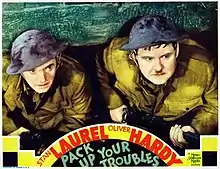Pack Up Your Troubles (1932 film)
Pack Up Your Troubles is a 1932 pre-Code Laurel and Hardy film directed by George Marshall and Raymond McCarey, named after the World War I song "Pack Up Your Troubles in Your Old Kit-Bag, and Smile, Smile, Smile". It is the team's second feature-length picture.[1]
| Pack Up Your Troubles | |
|---|---|
 US lobby card | |
| Directed by | George Marshall Raymond McCarey |
| Produced by | Hal Roach |
| Written by | H. M. Walker Stan Laurel (uncredited) |
| Starring | Stan Laurel Oliver Hardy James Finlayson Don Dillaway |
| Music by | Marvin Hatley |
| Cinematography | Art Lloyd |
| Edited by | Richard C. Currier |
Production company | |
| Distributed by | Metro-Goldwyn-Mayer |
Release date |
|
Running time | 68 min |
| Country | United States |
| Language | English |
Plot
In 1917, Stan (Stan Laurel) and Ollie (Oliver Hardy) are drafted into the American Expeditionary Force to fight in World War I. Their ineptitude during basic training antagonizes the drill sergeant and they are assigned to kitchen duties. When they ask the cook where they should put the garbage cans he sarcastically tells them to take them to the general. They take him at his word and put them in the general's private dining room. The cook (George Marshall), who is thrown in the stockade with them, curses their "snitching" and threatens them with violence after they are released. They escape his wrath when they are shipped to the trenches in France.
Serving close to the front line, they befriend soldier Eddie Smith, who receives a Dear John letter from his wife. When Eddie is killed in action, the boys determine to rescue Eddie's daughter (Jacquie Lyn) from her brutal foster father and deliver her to Eddie's parents. They distinguish themselves in combat by losing control of a tank and accidentally forcing a German platoon into the open.
After the Armistice, Stan and Ollie venture to New York City to retrieve the girl and look for Eddie's parents. Using the city telephone directory, the task proves both monumental and problematic as the boys blindly attempt to visit each Smith until they find the grandparents. After taking punches from an annoyed prizefighter and disrupting a society wedding, they resort to telephoning first.
While operating their lunch wagon, the boys are approached by an unpleasant civil servant (Charles Middleton) who demands Eddie's child so that she can be placed in an orphanage. The boys refuse, and the man says he will return with the police to have the boys arrested.
They try to secure a loan with their lunch wagon to finance their escape to another city, but the banker smirks that he'd have to be unconscious to make such a deal. While laughing, he topples a bust onto his own head and knocks himself out. Taking this as approval, the boys take what they need from the bank vault.
Tailed to their apartment by the police, the boys unsuccessfully try to hide Eddie's daughter in a dumbwaiter. The police bring the three of them to the banker for identification, but when they turn out their pockets the banker's wife finds a photograph of Stan and Ollie with Eddie and recognises him as her own son. The banker is the Smith they have been seeking all along! On learning that the little girl is his granddaughter, the banker drops the charges and invites them as his guests for dinner. The cook storms out of the kitchen to tell his boss that he will not adjust the service on a moment's notice, and recognizes Laurel and Hardy as the "snitches". The cook chases them with a kitchen knife.
Cast
- Stan Laurel as Stan
- Oliver Hardy as Ollie
- Don Dillaway as Eddie Smith
- Jacquie Lyn as Eddie's Baby
- Mary Carr as Old Woman With Letter
- James Finlayson as General
- Richard Cramer as Uncle Jack
- Adele Watson as Annie
- Tom Kennedy as Recruiting Sergeant
- Charles Middleton as Welfare Assistance Officer
- Richard Tucker as Mr. Smith Sr
- Muriel Evans as Wrong Eddie's Bride
- Grady Sutton as The Wrong Eddie
- C. Montague Shaw as Wrong Eddie's Father
- Billy Gilbert as Mr. Hathaway
- George Marshall as Pierre (uncredited)
References
External links
| Wikiquote has quotations related to: Pack Up Your Troubles (1932 film) |
